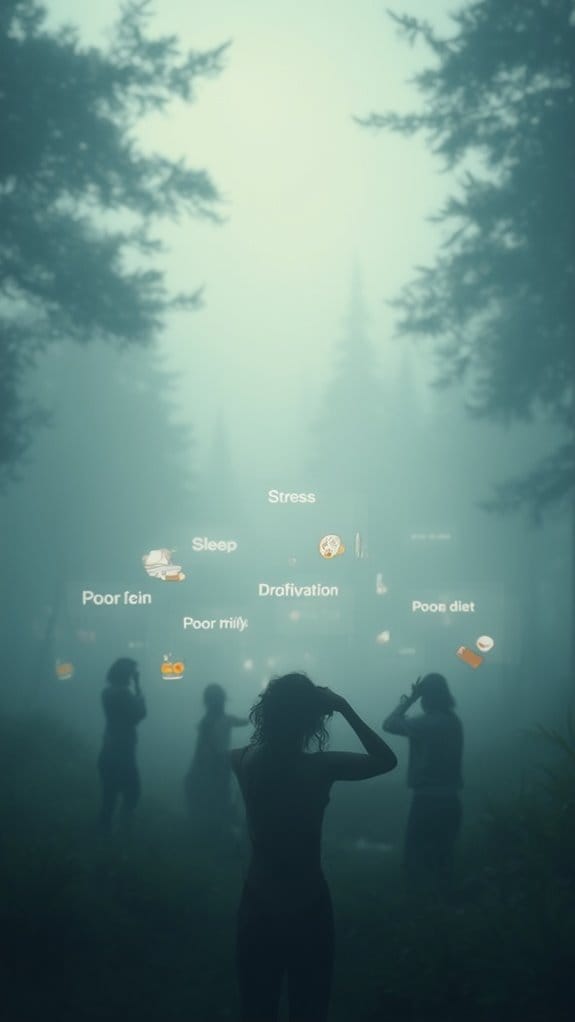Ever felt like your brain's in a fog? That’s brain fog—a frustrating state where clear thinking and focus seem miles away. It's like your mental battery's running low, making simple tasks feel overwhelming. This cloudiness can stem from stress, poor sleep, or even your diet. Recognizing brain fog is the first step to clarity, and guess what? There are plenty of ways to lift that haze. Stick around; you'll discover strategies to sharpen that mind of yours!
Key Takeaways
- Brain fog is a state of mental fatigue that reduces cognitive clarity and focus, making tasks feel overwhelming.
- Common causes include poor diet, lack of sleep, stress, hormonal changes, and mild dehydration.
- Symptoms involve cognitive fatigue, forgetfulness, difficulty concentrating, and decreased motivation.
- Stress negatively impacts cognitive function, leading to memory lapses and clouded judgment.
- Strategies to reduce brain fog include mindfulness practices, regular exercise, hydration, and consuming brain-boosting foods.
Understanding Brain Fog: Definition and Overview

Have you ever felt like your brain's running on low battery? You’re not alone.
Brain fog is that frustrating state where you struggle to focus, and your cognitive clarity feels like a distant dream. It’s not just about feeling tired; it’s like your mental acuity takes a vacation without telling you.
Imagine trying to piece together a puzzle, but half the pieces are missing. That’s what brain fog can feel like. It’s that cloudiness that makes simple tasks seem monumental, leaving you yearning for a mental reboot.
You might find it tough to remember names or concentrate during conversations. But understanding brain fog is the first step toward reclaiming your sharpness.
By recognizing it, you can explore ways to restore that clarity and energy, empowering you to break free from the haze and embrace your full potential.
Common Causes of Brain Fog

While you might think brain fog strikes out of nowhere, it often has some pretty common culprits lurking behind the scenes. Your lifestyle factors play a huge role—think poor diet, lack of sleep, or not moving your body enough.
Have you ever noticed how a late-night binge on snacks can leave you feeling hazy the next day? Hormonal changes are another sneaky contributor. Whether it's the ups and downs of your menstrual cycle or stress hormones running wild, these shifts can cloud your thinking.
Plus, let's not forget about hydration; even mild dehydration can zap your clarity. So, if you're feeling mentally sluggish, consider taking a step back and reflecting on these aspects of your life.
Symptoms and Signs of Mental Cloudiness

You might be wondering how to tell if brain fog is creeping into your daily life. Envision this: you’re sitting at your desk, but your thoughts feel jumbled, like a puzzle missing key pieces. That’s cognitive fatigue at play. You might struggle to focus or find yourself forgetting simple tasks, leading to that frustrating mental exhaustion.
Maybe you’re zoning out during conversations or having trouble making decisions. It’s like your brain’s running on low battery, and you might even feel a bit lost in your own thoughts.
Have you noticed your motivation slipping? That’s another sign! When brain fog kicks in, it can feel like you're wading through molasses—everything takes longer, and tasks seem overwhelming.
If you recognize these symptoms, it’s time to take a step back, breathe, and consider how to reclaim that mental clarity you crave. Freedom from brain fog is possible; you just need to recognize it first!
The Link Between Stress and Cognitive Function

Stress can sneak up on you, often leaving your cognitive function in a bit of a tailspin. Have you ever felt like your brain's running on empty? You're not alone!
Here's how stress messes with your mind:
- Memory Lapses: Stress can make it hard to remember important details, like that meeting at 3 PM.
- Focus Problems: You might find it challenging to concentrate, making even simple tasks feel overwhelming.
- Decision-Making Difficulties: Stress can cloud your judgment, leading to poor choices.
But don’t worry, stress management techniques can help you regain control.
By practicing mindfulness or engaging in regular exercise, you can build cognitive resilience. Think of it as a workout for your brain!
So, the next time stress starts to creep in, remember: you have the power to clear the fog and reclaim your mental clarity.
Ready to take charge?
Nutrition and Its Impact on Mental Clarity

When it comes to keeping your brain sharp, nutrition plays an essential role that many people often overlook. You might think that what you eat only affects your body, but your brain health is deeply connected to your diet.
Ever wonder why you feel foggy after a heavy meal? It’s not just in your head! Nutrition timing matters; fueling your brain with the right foods at the right times can boost your mental clarity. Think about it: a balanced meal filled with omega-3s, antioxidants, and whole grains can transform your focus and energy levels.
When you nourish your brain, you’re setting yourself up for success. So, next time you’re reaching for a snack, consider how it’ll impact your mind.
Wouldn’t you rather feel clear and sharp instead of clouded and sluggish? Embrace the freedom that comes with mindful eating, and watch your cognitive performance soar!
Sleep: The Unsung Hero of Cognitive Health

While it might seem like a luxury to catch those extra Z's, sleep is actually a powerhouse for your cognitive health. You might be surprised at how essential it's to your mental clarity.
Here are three reasons why sleep quality and duration matter:
- Memory consolidation: When you sleep, your brain sorts and stores memories, making it easier to recall information later.
- Mood regulation: A good night’s sleep helps keep your emotions balanced, reducing irritability and stress.
- Enhanced focus: Quality sleep boosts your attention span, allowing you to tackle tasks more efficiently.
Strategies for Managing and Reducing Brain Fog

Brain fog can feel like a thick cloud that rolls in just when you need to be sharpest, right? But don’t worry; you’ve got options to clear that haze!
First, try incorporating mindfulness techniques into your daily routine. Simple practices like deep breathing or meditation can help you regain focus and clarity, making it easier to tackle tasks.
Plus, let’s not forget the exercise benefits! Regular physical activity boosts blood flow to your brain, sharpening your thinking and lifting your mood. Whether it’s a brisk walk or a dance party in your living room, moving your body can work wonders.
Also, stay hydrated and eat brain-boosting foods like nuts and leafy greens; they fuel your mind.
When to Seek Professional Help

Have you ever wondered when it’s time to call in the experts for that pesky brain fog?
It can be tough to know, but prioritizing your brain health is essential.
Here are three signs that it might be time to seek professional help:
- Persistent Symptoms: If your brain fog lingers for weeks or even months, it’s worth a chat with a professional.
- Daily Impacts: When brain fog starts interfering with your work, relationships, or daily life, don’t hesitate to reach out.
- Other Symptoms: If you experience memory issues, mood swings, or fatigue alongside brain fog, a cognitive assessment could be beneficial.
Frequently Asked Questions
Can Brain Fog Affect Physical Performance as Well?
When you’re dealing with brain fog, you might notice that your physical performance takes a hit, too.
Cognitive fatigue can lead to exercise impairment, making it harder to focus and push through workouts. Have you ever felt sluggish even when you’re trying to be active? It’s frustrating!
Is Brain Fog a Temporary Condition or Chronic Issue?
Is brain fog a temporary condition or a chronic issue? Well, it can be both!
Sometimes, temporary triggers like stress or lack of sleep cause that cloudy feeling.
Other times, chronic factors—like certain health conditions—might keep it around longer.
It’s essential to listen to your body. If you find it’s sticking around, maybe it’s time to explore what’s going on.
After all, who wouldn’t want to clear the mental haze and feel sharp again?
Are There Specific Age Groups More Prone to Brain Fog?
Imagine your mind as a garden, vibrant with flowers, but as time passes, some petals start to wither.
Certain age groups, especially older adults, are more prone to brain fog due to age-related changes and cognitive decline. You might wonder why this happens, right?
Your brain’s ability to process information can slow down, making it feel like you’re wandering in a fog. Staying active and engaged can help clear that haze!
Can Medications Contribute to Brain Fog Symptoms?
Absolutely, medications can play a role in brain fog. Certain types, like antihistamines or antidepressants, might cloud your thoughts, especially at higher dosages.
Have you ever noticed feeling a bit hazy after taking a new prescription? It’s not just you! Everyone responds differently, so it’s essential to communicate with your doctor about how you feel.
Finding the right balance can help you regain clarity and keep that mental fog at bay!
How Does Technology Use Impact Brain Fog?
Ever wonder why you feel scattered after a long day of scrolling? Excessive screen time can lead to cognitive overload, leaving your brain feeling foggy.
Social media bombards you with endless information, creating a sense of information saturation that’s hard to escape. You might notice that the more you engage online, the harder it's to focus.
Finding a balance is key—your mind deserves some downtime from those screens, doesn't it?
Conclusion
To summarize, brain fog can feel like trying to think through a thick cloud. Imagine Sarah, a high school student, struggling to focus during her math tests after sleepless nights and junk food binges. By prioritizing sleep and nutrition, she found her clarity again. You too can take charge of your mental clarity! So, when you notice those foggy days creeping in, remember: small changes can lead to brighter, clearer moments. Don’t let brain fog hold you back!
